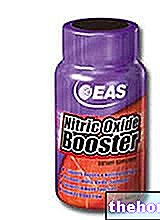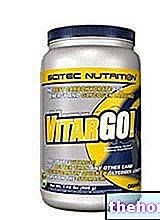" first part
Supplementation with branched chain amino acids
The intake of branched chain amino acids must take place about 30 minutes before exertion, during and / or after physical activity. Scientific studies have demonstrated the validity of their use when used in a 2: 1: 1 ratio (50% leucine, 25% isoleucine, 25% valine). The recommended daily requirement amounts in total to about 80-90 mg / kg / day (about 6 g / day for a 70 kg individual). In power or endurance athletes this dose can be raised to 150-200 mg / kg / day, equal to about 12-14 g of B.C.A.A. for an individual of 70 kg. The contributions relating to the intake of the BCAs refer only to the days of training or competition.
Food sources of branched chain amino acids
Amino acids, including branched-chain ones, are naturally present within animal proteins (meat, fish, eggs, milk, etc.) and, even if at a reduced level, within the proteins of the plant world (legumes, cereals, rice etc.). For obvious reasons, the integration in the form of pure and crystalline left-handed amino acids (L-), present in tablets or powders, brings back from the literature those improvements in performance, which have decreed its success in the world of sport, amateur and competitive. Scheme A shows the content of branched chain amino acids in various foods.

Guidelines of the Ministry of Health
The amount of daily intake should not normally exceed 5 g (as the sum of the 3 branched). It is advisable to combine it with B vitamins whose intake must be such as to provide, for the recommended dose, a quantity of the same not less than 30% of the RDA (recommended daily allowance).
Muscle Mass ™ in association with EsterDrive ™
Proaction S.r.l, in collaboration with Labomar Research of Istrana (Tv) has developed Muscle Mass> ™, a supplement of branched chain amino acids with vitamins and EsterDrive ™ (B1, B6, B12 and N-acetylcarnitine). Acetylcarnitine is a nitrogenous physiological substance responsible for transporting fatty acids inside the internal mitochondrial membrane to give rise to beta oxidation and then transform them into energy to be used by the cell.
Recent scientific studies have shown that various forms of carnitine, including in particular acetyl carnitine and acyl carnitines, significantly favor the enteric absorption of various classes of molecules for pharmaceutical and nutritional use, such as aciclovir, beta lactam antibiotics and amino acids. . It has been seen that N-acetyl carnitine is able to increase the enteric absorption of these substances for two hours from the intake and the presumed mechanism of action seems to be linked to the increase in the permeability of the intestinal mucosa and of the single enterocyte.
The graph (Fig. 2) shows the cellular absorption, in micro moles, of leucine (reference indicator of the level of branched amino acids in the blood during physical activity) for the duration of 2 hours, with a physical effort of 65 % of F / C max. Placebo is represented by maltodextrin tablets. Compared to the mix of branched chain amino acids in powder, generally more bioavailable than an equivalent tablet product, the intake of Muscle Mass ™ is able to improve cellular absorption of leucine exclusively thanks to the presence of EsterDrive ™. The production technology used to produce Muscle Mass ™ allows the gastric distraction of the tablets in a few minutes, in association with EsterDrive ™ a marked cellular absorption of the active ingredients (BCAA) is obtained with a consequent improvement effect in recovery in the athlete who uses it. . Athletes who want to avoid the reduction of muscle mass and at the same time want to optimize sports performance can take Muscle Mass ™, before, during or after sports.




























